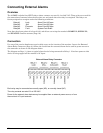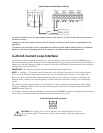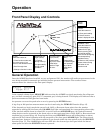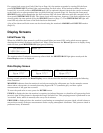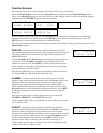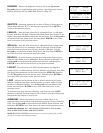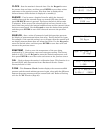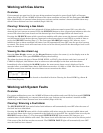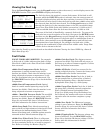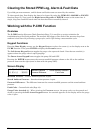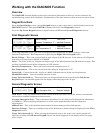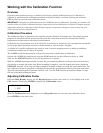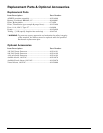
18 Instruction 3015-4286
Working with Gas Alarms
Overview
If the ammonia gas ppm level in the area being monitored exceeds its preset Leak, Spill, or Evacuate
Alarm level (Page
16), the AGMSZ will detect this alarm condition and turn ON the front panel ALARM
light. Additionally, an external alarm device may activate and the monitor’s internal audible alarm may
sound if those features have been enabled (Pages
10 & 16).
Clearing / Silencing a Gas Alarm
Once the gas-alarm circuit has been triggered all alarm indicators remain turned ON, even after the
detected gas level returns to normal. Press the SILENCE button to clear all gas-alarm indicators after the
cause of the alarm has been cleared and the detected gas level has dropped below all alarm levels.
Pressing the SILENCE button while a gas-alarm condition still exists causes the internal audible alarm
and all external alarm devices that are connected to the alarm relays to turn OFF for a period of time as
set by the SILENCE function (Page
17). The front panel ALARM light remains ON, however, as an
indication that an alarm condition still exists, but will automatically turn OFF once the gas level returns
to normal. The alarm circuit will reactivate at the end of the silence period if the detected gas level is still
above an alarm level.
Viewing the Gas Alarm Log
From the Data Display screen, use the Keypad buttons to place the arrow (>) on the display next to the
ALARMS function. Then press ENTER to display the alarm log.
The alarm log shows the type of alarm (LEAK, SPILL, or EVAC), plus the date and time it occurred. If
CLEAR is displayed, this indicates that an alarm was acknowledged at the date and time shown.
Immediately after selecting the ALARM function, the most recent alarm event is displayed. In the
example below, record #03 shows that a Spill Alarm occurred on 11/10/03 at 15:06. Note that if more than
30 alarm events have occurred, then the newest event overwrites the oldest.
Note that the Alarm Log can be cleared as described in Section
Clearing the Stored PPM Log, Alarm &
Fault Data (Page
20).
Working with System Faults
Overview
If a system malfunction occurs, the AGMSZ will detect the problem and turn ON the front panel SYSTEM
FAULT light. Additionally, an external alarm device may activate and the monitor’s internal audible
alarm may sound if those features have been enabled (Pages
10 & 16).
Clearing / Silencing a Fault Alarm
The SYSTEM FAULT light and all other fault indicators will automatically turn OFF after the cause of
the fault has been eliminated.
Pressing the SILENCE button while a fault condition still exists causes the internal audible alarm and
the external alarm device that is connected to the fault relay to turn OFF for a period of time as set by the
SILENCE function (Page
17). The front panel SYSTEM FAULT light remains ON, however, as a
reminder that a fault condition still exists. The alarm circuit will reactivate at the end of the silence period
if the cause of the fault has not been corrected. The SYSTEM FAULT light will automatically turn OFF
once the fault has been cleared.
#03 SPILL @
11/10/03 15:06



